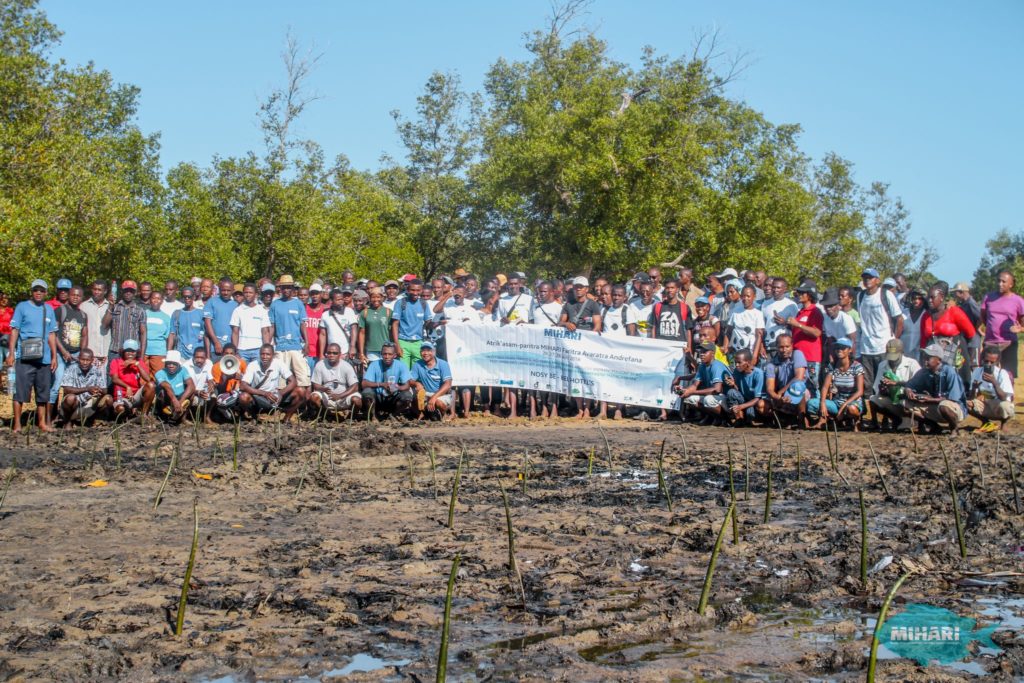170 participants including more than 130 small-scale fishers and community leaders from the Boeny, Diana and Sofia regions came together for MIHARI’s Northwest Regional Workshop from 25 to 28 April 2018. This annual meeting of the MIHARI Network began with the grand carnival of the 2018 Dugong Festival, hosted on the beautiful island of Nosy Be.
MIHARI is Madagascar’s national network of locally managed marine areas (LMMAs), created in 2012 to find solutions to the problems of the small-scale fishers of Madagascar. LMMAs are areas of ocean managed by coastal communities to help protect fisheries and safeguard marine biodiversity. For a country like Madagascar, with a coastline 5,200 kilometres long, LMMAs often represent the only effective management approach available for remote communities.
Madagascar’s first LMMA was created in 2003. Today, MIHARI is composed of more than 190 LMMA communities and 23 member organisations. The network operates in four regional subdivisions: Northwest (Boeny, Diana and Sofia), Northeast (Analanjirofo and Sava), Midwest (Melaky and Menabe) and South (Anosy and Atsimo Andrefana).
The Dugong Festival warns of the dwindling population of dugongs
The MIHARI Network obtained funding from the GEF Dugong and Seagrass Conservation Project for an initiative called "Fisher knowledge, awareness and behaviour change for the conservation of dugongs and seagrass using the MIHARI network of Locally Managed Marine Areas in Madagascar."
Dugongs, called trozona, lambohara or lambondriaka in Madagascar, are marine mammals whose population is declining because of habitat destruction and other anthropogenic pressures. They can grow up to 3 metres long, and live as long as 70 years. These large grazing animals help to maintain healthy inshore ecosystems by feeding on seagrass; a single individual can eat up to 70 kg in one day, keeping seagrass meadows in balance.
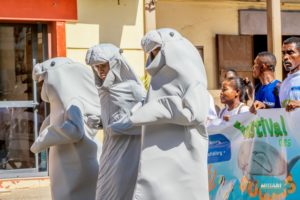
On 25 April 2018, the participants of the Northwest Regional Workshop, with the help of local youth associations engaged in environmental protection, held a carnival at Camp Vert Square in Nosy Be, to raise awareness of the declining dugong population. This carnival included theatrical performances, quizzes, exhibition stands, and speeches from community representatives.
Exchanges, capacity building and the mobilisation of northwest Madagascar
The theme of the Northwest Regional Workshop was "Let's engage to address the challenges of marine conservation and LMMAs in northwest Madagascar", and the participants had an action-packed week, including conferences, exchange visits and training sessions.
The week began with a visit to the Ambatozavavy LMMA on the morning of 26 April, where participants learned about the local history of the village, and planted more than 600 mangrove propagules to help reforest a vital ecosystem. In the afternoon, the participants attended conferences, where they discussed various topics with local authorities and regional technical services, including the challenges facing their marine resources.
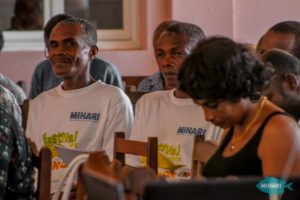
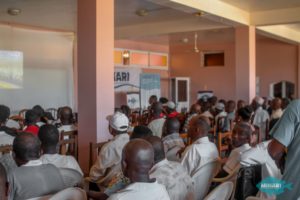
On 27 April, several training sessions were held, during which the participants strengthened their skills in leadership, conflict management and advocacy. After attending these workshops, Clarisse from the Ankivonjy LMMA in Mahajanga was feeling motivated: "Our willingness to contribute to the development of our communities and our country can really make a difference, it doesn’t matter how many years of education or diplomas you have."
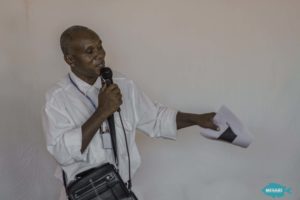 Edmond Ramadany, the Northwest Regional elected Vice President
Edmond Ramadany, the Northwest Regional elected Vice President
The MIHARI National Office has also expanded. In July 2017, representatives of the fishing communities of Madagascar elected the MIHARI national president, Hermany Emoantra, at the Fort Dauphin National Forum. At the Northwest Regional Workshop, the Regional Vice President was elected. Edmond Ramadany, from the Antenina LMMA in Ambaro Bay, won with 64% of the vote against his four opponents. "I want to help strengthen the solidarity between LMMAs, especially those that need more support or have been orphaned", said Ramadany just after his election win.
MIHARI, a key player for marine conservation in Malagasy civil society, raises the voices of small-scale fishers on regional, national and international levels. Once again, fishers from Madagascar have demonstrated their willingness to act for their future. The next MIHARI Regional Workshop is in the south (for Atsimo Andrefana and Anosy) to be held from 16 to 18 May in Toliara.

